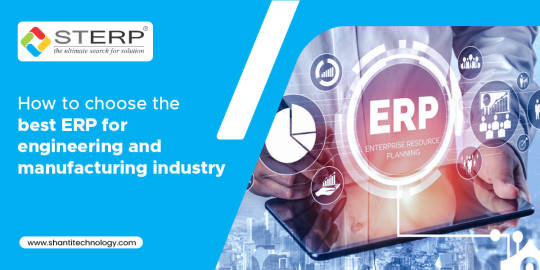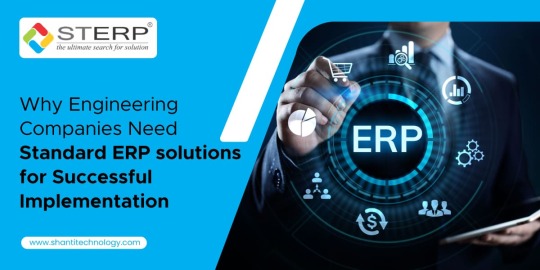#ERP solution for efficient project management
Explore tagged Tumblr posts
Text
#ERP solution for contractors#Contractor management software#Construction ERP software#All-in-one ERP for contractors#Best ERP for construction industry#Project management ERP for contractors#Contractor operations software#ERP for general contractors#ERP for specialty contractors#Streamlining contractor operations#Best ERP software for construction contractors#ERP for managing contractor bids and projects#Cloud-based ERP for construction industry#How to streamline contractor operations with ERP#ERP solution for efficient project management#Contractor job tracking software#Financial management ERP for contractors#AI-powered ERP for contractors#Real-time project tracking ERP#Contractor workforce management ERP
1 note
·
View note
Text
How to Choose the Best ERP for Engineering and Manufacturing Industry
In today’s fast-paced world, engineering and manufacturing companies face increasing pressure to deliver high-quality products while maintaining efficiency and cost-effectiveness. Implementing the right Enterprise Resource Planning (ERP) software can significantly enhance operations, streamline workflows, and boost productivity. However, with numerous options available, selecting the best ERP software for the engineering and manufacturing industry can be challenging. This guide will help you navigate this decision-making process and choose the most suitable solution for your business.

Why ERP is Crucial for Engineering and Manufacturing
ERP software integrates various business processes, including production, inventory management, supply chain, finance, and human resources. For engineering and manufacturing companies, ERP solutions are particularly vital because they:
Facilitate real-time data sharing across departments.
Enhance supply chain management.
Optimize production planning and scheduling.
Ensure compliance with industry standards.
Reduce operational costs.
Partnering with the right Engineering ERP software company ensures that your organization leverages these benefits to stay competitive in a dynamic market.
Steps to Choose the Best ERP for Engineering and Manufacturing
1. Understand Your Business Needs
Before exploring ERP solutions, evaluate your company’s specific requirements. Identify the pain points in your current processes and prioritize the features you need in an ERP system. Common features for engineering and manufacturing companies include:
Bill of Materials (BOM) management
Production planning and scheduling
Inventory control
Quality management
Financial reporting
Consulting with a reputed ERP software company can help you match your needs with the right features.
2. Look for Industry-Specific Solutions
Generic ERP software might not address the unique needs of the engineering and manufacturing sector. Opt for an ERP software in India that offers modules tailored to your industry. Such solutions are designed to handle specific challenges like multi-level BOM, project costing, and shop floor management.
3. Check Vendor Expertise
Choosing a reliable vendor is as important as selecting the software itself. Research ERP solution providers with a strong track record in serving engineering and manufacturing companies. Look for reviews, case studies, and client testimonials to gauge their expertise.
4. Evaluate Scalability and Flexibility
Your business will grow, and so will your operational requirements. Ensure that the ERP system you choose is scalable and flexible enough to accommodate future needs. The top 10 ERP software providers in India offer scalable solutions that can adapt to changing business demands.
5. Assess Integration Capabilities
An ERP system must integrate seamlessly with your existing tools, such as Computer-Aided Design (CAD) software, Customer Relationship Management (CRM) systems, and IoT devices. A well-integrated system reduces redundancies and enhances efficiency.
6. Prioritize User-Friendliness
A complex system with a steep learning curve can hinder adoption. Choose an ERP software with an intuitive interface and easy navigation. This ensures that your employees can use the system effectively without extensive training.
7. Consider Customization Options
No two businesses are alike. While standard ERP solutions offer core functionalities, some companies require customization to align with specific workflows. A trusted ERP software company in India can provide custom modules tailored to your unique needs.
8. Focus on Data Security
Engineering and manufacturing companies often deal with sensitive data. Ensure that the ERP solution complies with the latest security standards and offers robust data protection features.
9. Compare Pricing and ROI
While cost is an important factor, it should not be the sole criterion. Evaluate the long-term return on investment (ROI) offered by different ERP software. A slightly expensive but feature-rich solution from the best ERP software provider in India may deliver better value than a cheaper alternative with limited functionalities.
10. Test Before You Commit
Most ERP software companies offer free trials or demo versions. Use these opportunities to test the software in a real-world scenario. Gather feedback from your team and ensure the solution meets your expectations before finalizing your decision.
Benefits of Partnering with the Best ERP Software Providers in India
India is home to some of the leading ERP software providers in India, offering state-of-the-art solutions for the engineering and manufacturing sector. Partnering with a reputable provider ensures:
Access to advanced features tailored to your industry.
Reliable customer support.
Comprehensive training and implementation services.
Regular updates and enhancements to the software.
Companies like Shantitechnology (STERP) specialize in delivering cutting-edge ERP solutions that cater specifically to engineering and manufacturing businesses. With years of expertise, they rank among the top 10 ERP software providers in India, ensuring seamless integration and exceptional performance.
Conclusion
Selecting the right ERP software is a critical decision that can impact your company’s efficiency, productivity, and profitability. By understanding your requirements, researching vendors, and prioritizing features like scalability, integration, and security, you can find the perfect ERP solution for your engineering or manufacturing business.
If you are looking for a trusted ERP software company in India, consider partnering with a provider like STERP. As one of the best ERP software providers in India, STERP offers comprehensive solutions tailored to the unique needs of engineering and manufacturing companies. With their expertise, you can streamline your operations, improve decision-making, and stay ahead in a competitive market.
Get in touch with STERP – the leading Engineering ERP software company – to transform your business with a reliable and efficient ERP system. Take the first step toward a smarter, more connected future today!
#Manufacturing ERP software company#ERP solution provider#Engineering ERP software company#ERP software company#ERP software companies
5 notes
·
View notes
Text
4th Quarter Technologies (4QT) offers advanced Construction Purchase and Store Management Software Solutions designed to streamline and optimize the procurement and inventory management processes in the construction industry. These solutions cater to the specific needs of construction companies, helping them manage resources efficiently, reduce costs, and enhance overall project management.
2 notes
·
View notes
Text
Java's Lasting Impact: A Deep Dive into Its Wide Range of Applications
Java programming stands as a towering pillar in the world of software development, known for its versatility, robustness, and extensive range of applications. Since its inception, Java has played a pivotal role in shaping the technology landscape. In this comprehensive guide, we will delve into the multifaceted world of Java programming, examining its wide-ranging applications, discussing its significance, and highlighting how ACTE Technologies can be your guiding light in mastering this dynamic language.

The Versatility of Java Programming:
Java programming is synonymous with adaptability. It's a language that transcends boundaries and finds applications across diverse domains. Here are some of the key areas where Java's versatility shines:
1. Web Development: Java has long been a favorite choice for web developers. Robust and scalable, it powers dynamic web applications, allowing developers to create interactive and feature-rich websites. Java-based web frameworks like Spring and JavaServer Faces (JSF) simplify the development of complex web applications.
2. Mobile App Development: The most widely used mobile operating system in the world, Android, mainly relies on Java for app development. Java's "write once, run anywhere" capability makes it an ideal choice for creating Android applications that run seamlessly on a wide range of devices.
3. Desktop Applications: Java's Swing and JavaFX libraries enable developers to craft cross-platform desktop applications with sophisticated graphical user interfaces (GUIs). This cross-platform compatibility ensures that your applications work on Windows, macOS, and Linux.
4. Enterprise Software: Java's strengths in scalability, security, and performance make it a preferred choice for developing enterprise-level applications. Customer Relationship Management (CRM) systems, Enterprise Resource Planning (ERP) software, and supply chain management solutions often rely on Java to deliver reliability and efficiency.
5. Game Development: Java isn't limited to business applications; it's also a contender in the world of gaming. Game developers use Java, along with libraries like LibGDX, to create both 2D and 3D games. The language's versatility allows game developers to target various platforms.
6. Big Data and Analytics: Java plays a significant role in the big data ecosystem. Popular frameworks like Apache Hadoop and Apache Spark utilize Java for processing and analyzing massive datasets. Its performance capabilities make it a natural fit for data-intensive tasks.
7. Internet of Things (IoT): Java's ability to run on embedded devices positions it well for IoT development. It is used to build applications for smart homes, wearable devices, and industrial automation systems, connecting the physical world to the digital realm.
8. Scientific and Research Applications: In scientific computing and research projects, Java's performance and libraries for data analysis make it a valuable tool. Researchers leverage Java to process and analyze data, simulate complex systems, and conduct experiments.
9. Cloud Computing: Java is a popular choice for building cloud-native applications and microservices. It is compatible with cloud platforms such as AWS, Azure, and Google Cloud, making it integral to cloud computing's growth.

Why Java Programming Matters:
Java programming's enduring significance in the tech industry can be attributed to several compelling reasons:
Platform Independence: Java's "write once, run anywhere" philosophy allows code to be executed on different platforms without modification. This portability enhances its versatility and cost-effectiveness.
Strong Ecosystem: Java boasts a rich ecosystem of libraries, frameworks, and tools that expedite development and provide solutions to a wide range of challenges. Developers can leverage these resources to streamline their projects.
Security: Java places a strong emphasis on security. Features like sandboxing and automatic memory management enhance the language's security profile, making it a reliable choice for building secure applications.
Community Support: Java enjoys the support of a vibrant and dedicated community of developers. This community actively contributes to its growth, ensuring that Java remains relevant, up-to-date, and in line with industry trends.
Job Opportunities: Proficiency in Java programming opens doors to a myriad of job opportunities in software development. It's a skill that is in high demand, making it a valuable asset in the tech job market.
Java programming is a dynamic and versatile language that finds applications in web and mobile development, enterprise software, IoT, big data, cloud computing, and much more. Its enduring relevance and the multitude of opportunities it offers in the tech industry make it a valuable asset in a developer's toolkit.
As you embark on your journey to master Java programming, consider ACTE Technologies as your trusted partner. Their comprehensive training programs, expert guidance, and hands-on experiences will equip you with the skills and knowledge needed to excel in the world of Java development.
Unlock the full potential of Java programming and propel your career to new heights with ACTE Technologies. Whether you're a novice or an experienced developer, there's always more to discover in the world of Java. Start your training journey today and be at the forefront of innovation and technology with Java programming.
8 notes
·
View notes
Text
Is it Mandatory to Hire ERP Consultant?
Answer is YES
The Crucial Role of ERP Consultants Why You Need Them Before Jumping into ERP
Embarking on an Enterprise Resource Planning (ERP) implementation is a significant step for any organization. It promises streamlined processes, enhanced efficiency, and improved decision-making. However, the journey towards successful ERP adoption is laden with complexities and challenges that can derail even the most well-intentioned initiatives. This is where ERP consultants come into play, serving as invaluable guides and partners in the ERP journey. Here's why you need them before taking the plunge into ERP:
Expertise in ERP Systems ERP consultants are seasoned professionals with extensive knowledge and experience in various ERP systems. They understand the nuances of different platforms, functionalities, and their suitability for diverse business needs. Their expertise helps in selecting the right ERP solution tailored to your organization's requirements, ensuring maximum returns on investment.
Business Process Analysis One of the critical aspects of ERP implementation is aligning the system with existing business processes. ERP consultants conduct comprehensive analyses of your current workflows, identifying inefficiencies, bottlenecks, and areas for improvement. They then map these processes to the functionalities offered by the ERP system, ensuring a seamless integration that optimizes operations.
Customization and Configuration No two organizations are exactly alike, and a one-size-fits-all approach rarely yields optimal results in ERP implementation. ERP consultants assist in customizing and configuring the system to suit your specific business needs. Whether it's tailoring modules, designing workflows, or defining user roles, their expertise ensures that the ERP solution aligns perfectly with your organizational structure and objectives.
Change Management and Training ERP implementation often entails significant changes in workflows, roles, and responsibilities within an organization. Resistance to change can impede the adoption and success of the new system. ERP consultants facilitate change management strategies, helping employees understand the benefits of ERP, addressing concerns, and fostering a culture of acceptance and adaptation. Additionally, they provide comprehensive training programs to equip users with the skills and knowledge needed to leverage the full potential of the ERP system.
Project Management and Risk Mitigation: RP implementation is a complex undertaking involving multiple stakeholders, timelines, and resources. Without proper project management, it's easy for projects to spiral out of control, leading to delays, cost overruns, and subpar outcomes. ERP consultants oversee the implementation process from inception to completion, ensuring adherence to timelines, budgets, and quality standards. They also proactively identify and mitigate risks, minimizing potential disruptions and ensuring a smooth transition to the new system.
Post-Implementation Support The journey doesn't end with ERP go-live. Post-implementation support is crucial for addressing issues, fine-tuning the system, and maximizing its long-term value. ERP consultants provide ongoing support and maintenance services, helping organizations resolve technical glitches, optimize processes, and adapt to evolving business requirements.
In conclusion, ERP implementation is a strategic initiative that demands careful planning, execution, and support. By engaging ERP consultants early in the process, organizations can leverage their expertise to navigate the complexities of ERP adoption successfully. From system selection to post-implementation support, ERP consultants play a pivotal role in ensuring that your ERP journey is smooth, efficient, and ultimately, transformational for your business.
3 notes
·
View notes
Text
The Role of Scheme Management Software in Business

The corporate world has become more competitive recently, and with it, scheme management. If schemes are effectively managed, they play a crucial role in enhancing sales, customer satisfaction, and profits. The question then arises: Do sales executives need help coordinating their campaigns effectively, which poses challenges for maintaining customer satisfaction and profitability maximization? Does your company struggle with growth due to errors, delays, and inefficiencies caused by manual operations?
For those looking to streamline promotions and enhance efficiency, it's worth exploring scheme management software. This application is designed to streamline the process of managing offers and schemes for national distributors or manufacturers. It allows you to enter scheme parameters like validity period, scheme concept, terms and conditions, price involved, etc., into the system and share the information. Let's explore how it can drive business expansion.
What Makes Efficient Scheme Management So Important?
The scheme management platform helps manage promotional plans that involve developing, launching, and monitoring strategies to boost sales and revenue. Previously, errors, paperwork, and complex calculations were common while implementing schemes manually. Anticipated outcomes included inefficiencies and challenges in measuring program success.
Companies have shifted their approach to scheme administration by utilizing scheme management software. It streamlines various aspects of administration so businesses can effortlessly create, execute, and oversee schemes. It is recognized as workflow efficiency software because it enhances business productivity. Let’s explore how implementing this software can revolutionize your business operations and drive growth.
1. Adaptability in Defining Schemes
Scheme management software integrates supplier loyalty programs with defined regulations. Its dynamic system assists end-users in effectively planning, creating, and developing innovative strategies. Regarding channel sales management, field force automation, or sales tracking, software for managing schemes can be customized to fit specific client requirements.
2. Optimized Dealer Satisfaction
Supervisors can track project advancement through the scheme management app's enterprise resource planning (ERP) integration. It is structured and operates methodically, expediting the implementation of new projects. Additionally, it efficiently manages credit notes, boosting sales, customer trust, and overall profits.
3. Boosts Productivity
Once in auto mode, the scheme assessment speeds up and requires minimal human involvement. Scheme management software greatly enhances reclaiming schemes, which are known for their challenges and setbacks, resulting in lost opportunities. It improves productivity, generates leads, increases brand visibility, and fosters dealer confidence.
4. Emphasizing a Strong Sense of Responsibility
Operating scheme automation software involves significant responsibility, as it documents and displays all credit transactions, records, and deals. In addition, the software's report production feature simplifies generating reports on sales, events/promotions, costs, and costings.
Scheme management software enhances corporate operations, scheme performance, and sales. Streamlining design, validation, and monitoring processes enhances productivity and drives revenue growth.
Nural Schemes enables you to share schemes and evaluate their performance. It has benefited a wide range of sales professionals and retail outlets. Clients have experienced significant growth in human capital, revenue, and operational expense savings with various scheme combinations. Rely on Nural for optimizing business solutions and top-notch workflow efficiency software. Schedule a demo today.
3 notes
·
View notes
Text
How Salesforce Developers Shape the Future of Project Management Success?
The ever-changing field of project management has made technology developments crucial to the achievement of desired results. With the help of knowledgeable developers and consultants, Salesforce is a platform that can truly alter businesses, even in the face of an extensive number of competing offerings.
A Salesforce consultant will have a huge influence on how project managers succeed in the future. They will use Salesforce's features to improve teamwork, accelerate efficiency, and streamline procedures.
In this blog, we'll reveal the critical role that Salesforce developers play in influencing the success of project management. We'll explore their experience streamlining processes, streamlining work, and customizing solutions to drive productivity and cooperation in the fast-paced project environments of today.
Customized Solutions Crafting
Explore the ways in which developers modify modules, improve user experience, and guarantee scalability to ensure future-proofing of Salesforce systems.
Adapting Salesforce Modules:
The modules in Salesforce's suite are easily navigated by developers, who may easily customize features to fit project workflows. Whether creating complex workflows, setting unique items, or connecting third-party apps, developers take use of Salesforce's adaptability to create solutions that align with project goals.
User Experience Enhancement:
Developers may simply explore the modules in Salesforce's suite and modify functionalities to suit project procedures. Whether establishing custom items, integrating third-party apps, or building intricate workflows, developers leverage Salesforce's flexibility to build solutions that support project objectives
Scalability and Future-Proofing:
Future-focused, scalable, and flexible solutions are designed by developers. They future-proof project management systems by foreseeing possible expansion and changing needs, providing the groundwork for long-term success and adaptability.

Seamless Collaboration Integration
Examine how seamless collaboration integration may strengthen teamwork, bridge systems, and enable data-driven decision-making.
System Integration:
By utilizing middleware and APIs, developers can plan the smooth connection of Salesforce with other vital programs and systems. Integration facilitates data flow and guarantees a cohesive environment through connections with project management software, communication tools, and enterprise resource planning (ERP) systems.
Collaborative Workspace:
Within Salesforce, developers create collaborative workspaces that enable teams to share insights, interact in real time, and centralize communication. Transparent communication and knowledge sharing are facilitated by features like Chatter, Communities, and interfaces with Slack and other collaborative applications.
Data-Driven Decision Synthesis:
Developers facilitate the extraction of meaningful insights from heterogeneous data sources for project stakeholders by providing integrated analytics and reporting functionalities. Through the synthesis of data in Salesforce, ranging from project status to customer feedback, stakeholders can efficiently minimize risks, make well-informed decisions, and drive strategic objectives.
Automation for Enhanced Efficiency
Investigating data synthesis, collaborative workspaces, and efficient procedures for well-informed decision-making.
Workflow Automation:
Developers use Salesforce's automation features, such Flow and Process Builder, to standardize procedures and automate time-consuming tasks. They manage workflows that reduce human error, speed up task completion, and increase overall efficiency by specifying triggers, actions, and approval processes.
AI-Powered Insights:
By using artificial intelligence (AI) tools such as Salesforce Einstein, developers are able to introduce intelligence into project management procedures. AI-driven insights enable project teams to make data-driven decisions quickly, from sentiment analysis that measures stakeholder satisfaction to predictive analytics that predicts project timeframes.

Mobile Optimization:
Salesforce is optimized for mobile devices by developers who understand how important mobility is in today's dynamic work environment. They ensure that project stakeholders can access vital information and complete activities while on the go by utilizing native app development and responsive design, which promotes responsiveness and productivity.
Conclusion
In conclusion, Salesforce developers are the engine of innovation, using the platform's potential to entirely rethink the project management sector in conjunction with Salesforce consulting experience. By means of customization, automation, and integration, they facilitate enterprises in achieving unparalleled levels of efficiency, collaboration, and success. The combined experience of consultants and Salesforce developers will be essential in steering project management's future course toward even higher success and quality as it develops.
FAQs About Salesforce Developers and Project Management
How do Salesforce developers contribute to project management success?
Salesforce developers streamline project workflows, automate tasks, and customize solutions, enhancing efficiency and collaboration for project teams.
What skills do Salesforce developers bring to project management?
Salesforce developers possess expertise in coding, data management, and platform customization, enabling them to tailor solutions that align with project goals and requirements.
Why is Salesforce considered crucial for future project management?
Salesforce's robust platform offers scalable solutions, real-time insights, and seamless integration capabilities, empowering project managers to drive innovation and achieve project success efficient
#remote work#technology#hire salesforce developer#hire salesforce consultant#project manager#tech jobs#Future of businesses
3 notes
·
View notes
Text
Evolution of Technology and Its Impact on EdTech
In today's digital age, technology continues to evolve at an unprecedented pace, transforming various aspects of our lives, including education. With the advent of EdTech (Educational Technology), traditional educational paradigms are being reshaped, leading to more interactive, accessible, and personalized learning experiences.
Evolution of Technology: A Brief Overview
The evolution of technology has been marked by significant milestones, from the invention of the printing press to the rise of the internet and beyond. Each technological advancement has revolutionized how information is accessed, shared, and utilized, paving the way for transformative changes in education. From chalkboards to interactive whiteboards, from textbooks to digital learning platforms, technology has played a pivotal role in shaping modern education.
Integration of Technology in Education: The Rise of EdTech
As technology continues to advance rapidly, it's crucial for us to stay ahead in the ever-evolving EdTech industry. With this in mind, we've developed an incredibly advanced EdTech software Proctur that offers a comprehensive suite of features tailored to meet the needs of schools, teachers, and parents. We understand the importance of having everyone on the same page, and our platform ensures 100% transparency by bringing schools, teachers, and parents together onto a single unified platform.
Here's a glimpse of the key features our EdTech software offers:
1.User Role Management :Customize user access and ensure data security with ease using our User Role Management feature within our School ERP—empowering efficient administration and peace of mind.

2. Visitor Management : Transform school safety and efficiency with our innovative Visitor Management system! Elevate security while simplifying check-ins for a smarter school experience.

3.Zoom Integration: Facilitate interactive live classes seamlessly with Proctur's ERP Zoom integration feature for enhanced educational engagement.

Bus Tracking System:
We understand the importance of student safety, which is why our software includes a bus tracking system that allows parents to track the whereabouts of their child's school bus in real-time.
At our core, we believe in creating a supportive and inclusive educational ecosystem where every stakeholder – schools, teachers, and parents – plays a vital role in shaping the future of our students.
EdTech Market Size: A Global Perspective:
The global EdTech market has experienced exponential growth in recent years, driven by increasing digitalization, rising demand for online education, and advancements in technology. According to market research reports, the Indian EdTech market size was valued at over $20 billion in 2022, and it is projected to continue its upward trajectory in the coming years.
EdTech Market in India: Trends and Opportunities
In India, the EdTech sector has witnessed remarkable growth fueled by factors such as a large young population, increasing internet penetration, and government initiatives promoting digital education. The market size of EdTech in India is estimated to be around $4.3 billion in 2022, with notable players offering a diverse range of solutions catering to different segments of the education ecosystem.
Conclusion
In conclusion, as technology continues to revolutionize the education sector, Proctur, as showcased on their website proctur.com, exemplifies how advanced EdTech solutions can streamline education management processes and foster transparency between schools, teachers, and parents. Through Proctur's innovative approach to education management, schools can efficiently manage their resources, track student progress, and enhance parent engagement. With Proctur leading the way, the future of education management looks brighter than ever before.
#proctur#edtecherp#edtech#school management software#school management system#classroom management#yourpocketclassroom
2 notes
·
View notes
Text
The Top Choice: Oracle Enterprise Resource Planning Cloud Service for Your Business Success
Are you searching for the best solution to streamline your business operations? Look no further than the Top Choice: Oracle Enterprise Resource Planning (ERP) Cloud Service. In today's fast-paced business world, organizations need a robust ERP solution to optimize their processes, enhance productivity, and drive growth. Oracle ERP Cloud Service, crowned as the best in the industry, offers a comprehensive suite of tools designed to meet the demands of modern businesses.
Why Choose the Best: Oracle Enterprise Resource Planning Cloud Service?
Oracle ERP Cloud Service stands out as the Best Option for businesses across various industries. Here's why:
Scalability: Easily scale your ERP system as your business grows, always ensuring seamless operations.
Integration: Integrate ERP with other Oracle Cloud services for a unified business platform.
Real-time Insights: Gain valuable insights into your business with real-time analytics, enabling data-driven decision-making.
Security: Rest easy knowing your data is secure with Oracle's advanced security features.
Frequently Asked Questions about the Best Choice: Oracle ERP Cloud Service
Q1: What modules are included in Oracle ERP Cloud Service?
A1: Oracle ERP Cloud Service includes modules for financial management, procurement, project management, supply chain management, and more. Each module is designed to optimize specific aspects of your business.
Q2: Is Oracle ERP Cloud Service suitable for small businesses?
A2: Yes, Oracle ERP Cloud Service is scalable and can be tailored to meet the needs of small, medium, and large businesses. It offers flexible solutions suitable for businesses of all sizes.
Q3: How does Oracle ERP Cloud Service enhance collaboration among teams?
A3: Oracle ERP Cloud Service provides collaborative tools that enable teams to work together seamlessly. Features like shared calendars, document management, and task tracking enhance communication and collaboration.
Conclusion: Empower Your Business with the Best ERP Solution
Oracle Enterprise Resource Planning Cloud Service is not just a choice; it's the Ultimate Solution for businesses seeking to optimize their operations. By harnessing the power of Oracle ERP, you can streamline processes, improve efficiency, and drive innovation. Don't let outdated systems hold your business back. Embrace the future with Oracle ERP Cloud Service and propel your business to new heights.
Ready to transform your business? Contact us today to explore the endless possibilities with the best ERP solution on the market.
#oracle#oracle erp#rapidflow#oracle erp cloud service#best erp solution#oracle erp service providers#business#business automation#oracle services#enterprise software#scalability#integration#rpa#market#erp
3 notes
·
View notes
Text
Top Challenges Faced While Implementing Salesforce CPQ

Salesforce CPQ is one of the widely used Salesforce products used by salesperson to create sales quotes easily and with best efficiency.
However, Implementing Salesforce CPQ (Configure, Price, Quote) is not a simple task and requires domain expertise. Businesses often face several challenges while implementing it. Businesses must always consult with Salesforce CPQ Consulting services providers which can ensure them hassle free and quick implementation. So, In this blog, we are going to discuss about the challenges faced during Salesforce CPQ Implementation:
Data Integration: Salesforce CPQ typically needs to integrate with various data sources, such as CRM, ERP, and pricing databases. Ensuring smooth data integration and data quality can be challenging, especially when dealing with legacy systems.
Customization Complexity: Salesforce CPQ is a highly customizable tool, and organizations often need to tailor it to their specific needs. However, extensive customization can lead to complexity and longer implementation timelines. Balancing customization with out-of-the-box functionality is essential.
Pricing Strategy: Determining the right pricing strategy and translating it into Salesforce CPQ rules and configurations can be complex. You need to consider factors like pricing tiers, discounts, promotions, and bundling while ensuring profitability.
Product Complexity: If your organization offers a wide range of complex products with multiple configuration options, managing and configuring these in Salesforce CPQ can be challenging. It's crucial to have a well-structured product catalog and configuration rules.
Unclear Objectives and Business Goals Alignment: It has been found several times that businesses make the decision of implementing technologies in a rush just looking at the emerging technologies. So, they are not able to properly align their business objectives with the technologies and hence proper tool utilization is not done.
Performance Optimization: As the system grows and more users access it, you might encounter performance issues. Regular performance monitoring and optimization are necessary to ensure a smooth user experience.
Scalability & Flexibility: As the business evolves with the time with product offerings and customer base growing and so the Salesforce CPQ solution should be. A solution that cannot be evolved with the time, literally becomes a liability. So, businesses need to ensure that their Salesforce CPQ implementation can scale with their business requirement.
Regulatory Compliance: Depending on your industry, you may need to adhere to specific regulatory requirements related to pricing, quoting, and contracts. Ensuring that Salesforce CPQ meets these compliance standards can be a challenge.
Testing and Quality Assurance: Thoroughly testing the Salesforce CPQ implementation is crucial to identify and resolve any issues before they impact sales operations. Developing comprehensive test plans and involving end-users in testing are vital.
End User Training: It must be ensured that the end users should receive the necessary training required to handle the tool so that they can work efficiently. In many of the cases, it has been found the end users does not enough training and found technical complexities in using the tool.
Ongoing Maintenance and Support: After the initial implementation, you'll need a plan for ongoing maintenance and support. This includes addressing user issues, updating configurations to reflect changes in pricing or products, and applying software updates.
Cost Management: Implementing Salesforce CPQ can be expensive, considering licensing costs, customization, and integration expenses. Managing the budget and ensuring that the project stays within scope can be a challenge.
To address these challenges, organizations should involve key stakeholders, engage with experienced Salesforce CPQ consultants or partners like Hexaview Technologies, and plan the implementation carefully. It's also essential to have a clear roadmap and set realistic expectations for the project timeline and outcomes. Regular communication and feedback loops with users and stakeholders are critical to ensure the success of Salesforce CPQ implementation. Hexaview Technologies is a renowned Salesforce services providers that offers a gamut of Salesforce related services like Salesforce consulting, Salesforce Development Services, Salesforce Data Migration, Migration to Salesforce CRM, Salesforce CPQ consulting etc.
#salesforce cpq#Salesforce cpq consulting#Salesforce cpq consultants#cpq consultants#cpq#cpq software#salesforce#crm
3 notes
·
View notes
Text
#ERP solution for contractors#Contractor management software#Construction ERP software#All-in-one ERP for contractors#Best ERP for construction industry#Project management ERP for contractors#Contractor operations software#ERP for general contractors#ERP for specialty contractors#Streamlining contractor operations#Best ERP software for construction contractors#ERP for managing contractor bids and projects#Cloud-based ERP for construction industry#How to streamline contractor operations with ERP#ERP solution for efficient project management
0 notes
Text
Why Engineering Companies Need Standard ERP Solutions for Successful Implementation
In today’s fast-paced manufacturing industry, the need to streamline operations, improve efficiency, and ensure growth is paramount. Businesses, especially in the engineering and manufacturing sectors, are turning to ERP software to manage their operations effectively. Enterprise Resource Planning (ERP) software is a game-changer for manufacturers looking to grow faster by integrating their processes and providing a comprehensive solution for resource management, decision-making, and scalability. If you are a manufacturer in India or a growing business in Bhopal, partnering with the right ERP software company in Bhopal could be the key to unlocking your potential. This blog explores the benefits of ERP software for manufacturers, the role of local ERP software providers in Bhopal, and why adopting ERP solutions is essential for success in today’s competitive landscape.

What Is ERP Software and Why Does It Matter?
ERP software is an integrated system that unifies core business processes such as procurement, inventory management, production planning, finance, and customer relationship management (CRM) into a centralized platform. This ensures seamless communication between departments, minimizes errors, and optimizes resource usage. For manufacturers, manufacturing enterprise resource planning solutions offer specific functionalities to address production scheduling, supply chain management, and quality control. These features are critical for scaling operations and improving overall business performance.
Benefits of ERP Software for Manufacturers
1. Centralized Operations
Manufacturers handle a wide range of tasks daily, from raw material procurement to final product delivery. ERP software integrates all these processes into a single platform, eliminating silos and ensuring real-time communication. Leading ERP software providers in Bhopal specialize in offering solutions tailored to manufacturing needs, ensuring smoother operations.
2. Enhanced Decision-Making
ERP systems provide accurate, real-time data through intuitive dashboards and analytics tools. This enables business leaders to make informed decisions, whether it is about production schedules, resource allocation, or financial forecasting. Engineering firms, in particular, can benefit from ERP software for engineering companies in India, which offers insights specific to their project-oriented workflows.
3. Optimized Resource Utilization
Effective resource management is critical in manufacturing. ERP software helps monitor and allocate raw materials, workforce, and equipment efficiently, reducing waste and ensuring optimal use of resources. By partnering with an engineering ERP software company in Bhopal, businesses can access customized solutions that cater to their unique requirements.
4. Improved Productivity
Automation of routine tasks, such as inventory tracking and order processing, frees up employees to focus on more strategic activities. This boost in productivity is a significant reason why manufacturers using ERP software for engineering companies experience faster growth.
5. Scalability
As manufacturing businesses grow, their operational needs become more complex. ERP systems are designed to scale with the organization, supporting additional locations, products, and services. Local ERP software companies in Bhopal provide scalable solutions that align with the growth trajectories of businesses in the region.
Why Bhopal Manufacturers Should Choose Local ERP Providers
Bhopal’s manufacturing and engineering sectors are thriving, thanks to its strategic location and growing industrial base. Local businesses stand to gain significantly by adopting ERP systems offered by experienced ERP software providers in Bhopal.
1. Tailored Solutions
Local providers understand the specific challenges faced by manufacturers in Bhopal and can customize solutions to meet their needs. For example, ERP software companies in Bhopal may offer modules tailored to local supply chains or compliance requirements.
2. On-the-Ground Support
Partnering with a local ERP software company in Bhopal ensures faster response times and personalized support during implementation and maintenance. This reduces downtime and ensures a smoother transition.
3. Cost-Effectiveness
Local ERP providers offer cost-effective solutions by eliminating the need for long-distance travel or remote troubleshooting. Businesses in Bhopal can enjoy world-class services without breaking the bank.
ERP Software for Engineering Companies in India
Engineering companies often deal with project-based operations requiring precise planning, tracking, and execution. ERP software for engineering companies in India is designed to address these needs, offering features like project management, resource scheduling, and cost tracking.
In Bhopal, collaborating with an engineering ERP software company in Bhopal ensures that local engineering firms have access to specialized solutions. These tools not only enhance operational efficiency but also improve project delivery timelines, leading to greater customer satisfaction.
ERP for Manufacturing Companies in India
India’s manufacturing sector is booming, driven by government initiatives and growing demand. To stay competitive, businesses must invest in advanced tools like ERP for manufacturing companies in India. These systems help manufacturers streamline production, manage supply chains, and maintain quality standards.
For manufacturers in Bhopal, adopting ERP software in Bhopal is a strategic move to keep pace with industry leaders. Features like real-time inventory management, production scheduling, and demand forecasting ensure businesses can respond quickly to market changes.
Real-Life Benefits of ERP Implementation
Manufacturers who implement ERP systems report:
Reduced Costs: By optimizing processes, ERP systems lower operational costs.
Faster Delivery: Improved production planning leads to quicker order fulfillment.
Better Quality: Automated quality checks ensure products meet customer expectations.
Businesses in Bhopal that have partnered with ERP software companies in Bhopal have experienced significant improvements in productivity, customer satisfaction, and revenue growth.
How to Choose the Right ERP Software Company in Bhopal
Selecting the right ERP provider is critical for a successful implementation. Here is what manufacturers should look for in an ERP software company in Bhopal:
Industry Expertise: Choose providers specializing in ERP software for engineering companies or manufacturing sectors.
Customization: Ensure the solution aligns with your unique business processes.
Local Presence: A local provider offers faster support and a better understanding of regional requirements.
Scalability: Opt for a system that can grow with your business.
Conclusion
ERP software is no longer a luxury but a necessity for manufacturers aiming to grow faster and compete effectively. By integrating operations, improving resource management, and enhancing decision-making, ERP systems empower businesses to achieve their goals. For manufacturers in Bhopal, collaborating with a trusted ERP software company in Bhopal ensures tailored solutions, cost-effectiveness, and reliable support.
Whether you are part of the engineering sector or a manufacturing enterprise, investing in manufacturing enterprise resource planning solutions will position your business for success in today’s dynamic market. Do not wait—explore the benefits of ERP software in Bhopal today and take the first step toward sustainable growth.
#ERP for manufacturing company in India#ERP implementation company in India#Best ERP implementation agecny#STERP#ERP software for engineering companies#Manufacturing enterprise resource planning#Rajkot#Surat#Ahmedabad#Gujarat#Maharashtra#Mumbai#Pune#Bhopal#Indore#Madhya Pradesh#ERP software for engineering companies in India#ERP integration#cloud ERP#ERP India#small business#ERP implementation
3 notes
·
View notes
Text
How an ERP Company in Hyderabad Can Help an Organization

Organizations need effective system to streamline operations to enhance productivity and improve decision-making. An ERP company in Hyderabad plays an important role in the journey of businesses to integrate the process, optimize the available sources for sustainable growth. A business with the help of technology can overcome its day-to-day issues of coordination among departments, streamlining tasks, employee’s attendance and many. Enterprise Resource Planning (ERP) provides a centralized platform where all departments and tasks are streamlined. Maven Group is an IT and Digital marketing company in Hyderabad, which offers various services under IT including ERP Solutions in Hyderabad.
ERP Helps in Enhanced Business Efficiency
An ERP company in Hyderabad can provide solutions to organize the business functions to name a few such as human resources, finance, sales, customer service and inventory management. By streamlining the processes there will be reduction in manual errors and improve overall efficiency.
Improved Decision-Making
With the available real-time data analytics, reporting features the accurate insights of a company’s performance can easily obtained. Every department’s performance can be analysed, if necessary, resources can be allotted to improve the performance of the respective department. An ERP company in Hyderabad ensures that data analytics tools are available to businesses to have actionable intelligence to stay them ahead of competition.
Cost Savings and ROI
Initial investment is required to setup ERP system, but in the long term it has many benefits. The businesses have operational expenses to incur in day-to-day activities, with the help of ERP businesses wastage can be controlled, available resources can be used efficiently. Maven Group, an ERP company in Hyderabad provides customizable solutions that align business need which ensures businesses to achieve a high return on investment (ROI) over time.
Scalability and Growth
Businesses can survive this competitive world only by expanding their operations and spreading to different locations. This is a challenge for any business to handle with manual process, whereas ERP system is scalable which allows to add new features, modules and customize as required by the businesses. Maven Group, with its experienced team of developers can deliver the projects within the timelines.
Better Customer Relationship Management
An ERP system not only benefits internal operations but also enhances customer satisfaction. By integrating customer relationship management (CRM) functionalities, businesses can track customer interactions, manage orders, and provide personalized services. An ERP company in Hyderabad ensures that businesses can build stronger relationships with their customers by offering a seamless and efficient service experience.
Conclusion
Incorporating an ERP system into an organization’s operations is a strategic move that enhances efficiency, decision-making, and overall business performance. Maven Group, an ERP company in Hyderabad offers tailored solutions to meet the unique requirements of businesses across various industries. By implementing an ERP system, companies can optimize their resources, reduce costs, and stay ahead in a competitive market. Whether you are a small business or a large enterprise, partnering with us an ERP provider in Hyderabad can drive growth, innovation, and long-term success.
affordable seo services in hyderabadbest digital agency in hyderabadbest digital marketing agency in hyderabadbest seo services agency in hyderabadbest web designing company in hyderabadDigital Marketing Agency in HyderabadERP company in HyderabadERP Services in HyderabadSEO Agency in Hyderabad
0 notes
Text
Best Software Development Company for Manufacturing Industry
The manufacturing industry is undergoing a significant transformation with the integration of advanced technologies such as IoT, AI, and cloud computing. To stay competitive, manufacturers need robust software solutions that can streamline operations, improve productivity, and reduce costs. Choosing the right software development company for manufacturing industry can be the key to transforming your operations and enabling long-term success.

This article explores what makes a company the best software development partner for the manufacturing sector, and what specific manufacturing software development services they offer to help companies optimize their processes.
Why Manufacturing Industry Needs Specialized Software Development
Manufacturing is a complex industry with numerous processes, from procurement and production to inventory management and distribution. Standard off-the-shelf software may not address the intricacies of these workflows. Custom-built software solutions for manufacturing provide an integrated approach to handle the following:
Production Planning & Scheduling: Streamline the manufacturing process to optimize resources and ensure timely delivery.
Supply Chain Management: Maintain full control over suppliers, vendors, and distribution channels.
Inventory Control: Ensure real-time tracking of raw materials, in-progress items, and finished products.
Quality Assurance: Implement automation and monitoring tools to guarantee that products meet required standards.
Equipment Maintenance: Predictive maintenance tools can help reduce downtime and extend equipment life.
A trusted software development company with expertise in the manufacturing industry can offer tailored solutions that address all these needs.
Key Features of Software Development Company for Manufacturing Business

To determine the best software development company for manufacturing, it’s important to evaluate key factors that indicate reliability, technical expertise, and an understanding of the industry’s unique challenges. Here’s what to look for:
1. Industry-Specific Expertise
The manufacturing sector has its own set of challenges, from fluctuating supply chains to complex production schedules. The best software development company will have experience in working with manufacturing clients and possess a deep understanding of the industry’s specific requirements. They should be able to offer custom solutions that directly address issues like production efficiency, process automation, and supply chain optimization.
2. Proven Track Record
Look for companies with a proven track record of delivering successful manufacturing software projects. A portfolio of satisfied clients and case studies detailing previous work in the manufacturing domain can provide reassurance that the company can handle your unique software requirements.
3. Comprehensive Manufacturing Software Development Services
The best software development companies provide a range of services designed to meet the evolving needs of manufacturers. These include:
Enterprise Resource Planning (ERP) Systems: Fully integrated systems that help manufacturers manage everything from inventory to accounting in one place.
Manufacturing Execution Systems (MES): Software solutions that control and monitor production processes in real-time, ensuring maximum efficiency.
Supply Chain Management (SCM) Solutions: Platforms that allow manufacturers to track and manage every aspect of their supply chain, from raw materials to delivery.
Product Lifecycle Management (PLM) Software: Tools that help manufacturers manage the entire lifecycle of a product, from conception to disposal.
IoT Integration: Internet of Things (IoT) technologies that allow for real-time data collection and monitoring of manufacturing equipment.
4. Scalability and Flexibility
Manufacturing operations often change as businesses grow or enter new markets. The software development company you choose should provide scalable solutions that can adapt to your evolving needs. This means the software should be flexible enough to accommodate new processes, technologies, or increased production demands without major disruption.
5. Focus on Innovation
Technology is constantly evolving, and the manufacturing industry is no exception. The best software development companies stay up to date with the latest trends, such as Industry 4.0, AI-driven automation, and cloud-based solutions. They should be able to leverage these innovations to create cutting-edge software that gives manufacturers a competitive advantage.
Top Manufacturing Software Development Services

Leading software development companies offer a variety of services aimed at optimizing manufacturing processes and improving operational efficiency. Here are some core manufacturing software development services that are critical for modern manufacturers:
1. Custom ERP Solutions for Manufacturing
ERP systems are essential for coordinating different parts of the manufacturing process, including production, finance, human resources, and inventory. Custom ERP solutions can be tailored to meet the specific demands of each manufacturer, providing full integration across departments and improving overall efficiency.
2. Manufacturing Execution Systems (MES)
An MES tracks and documents the transformation of raw materials to finished products. These systems monitor real-time production, gather data, and analyze process performance. With an effective MES, manufacturers can reduce waste, increase production efficiency, and improve product quality.
3. Supply Chain Management Software
Supply chain visibility is crucial for manufacturers, especially in the face of global disruptions. Custom SCM solutions enable companies to optimize logistics, track inventory, predict demand, and manage suppliers in real time. With these tools, manufacturers can create more resilient supply chains and prevent bottlenecks.
4. Quality Management Systems (QMS)
Ensuring product quality is one of the most important aspects of manufacturing. A QMS helps track defects, monitor compliance, and implement corrective actions. Custom-built quality management systems ensure that products consistently meet customer and regulatory standards.
5. IoT Solutions for Smart Manufacturing
With the rise of the Internet of Things (IoT), manufacturers can now connect machines, equipment, and devices to the internet for real-time monitoring and control. IoT solutions enable predictive maintenance, remote monitoring, and data-driven insights that reduce downtime and increase productivity.
Conclusion
The best software development company for the manufacturing industry will understand the complexity of your business and offer customized solutions to meet your needs. By partnering with an experienced provider of manufacturing software development services, you can optimize your operations, reduce costs, and boost productivity. Be sure to choose a partner with a proven track record, industry expertise, and a commitment to innovation that will help take your manufacturing business to the next level.
��� Contact Us Today for a Consultation and Turn Your Vision into Reality!
🌐 www.ebslon.com
#Manufacturing Software Development Company#Manufacturing Software Development#Software Development Company for Manufacturing Industry#Software Development for Manufacturing#Manufacturing Software Developer#Manufacturing Software Development services#Software#Software Development#Manufacture#Manufacturing
1 note
·
View note
Text
North America Debt Collection Software Market Comprehensive Research Study Estimated to Perceive Accrued Value with a Staggering CAGR
The North America debt collection software market is expected to grow from US$ 1,327.62 million in 2022 to US$ 2,367.23 million by 2028. It is estimated to grow at a CAGR of 10.1% from 2022 to 2028.
Growing Adoption of Self-Service Payment Models in North America Debt Collection Software Market
The market growth is attributed to the increasing demand for debt collection software due to the increased adoption of self-service payment models. Growing preference for collections software to streamline collections and automate the loan collection process is expected to drive market growth. The debt collection software market is projected to witness robust growth as businesses increasingly implement self-service payment platforms to keep track of their customers, track bill payments and maintain credibility.
📚 𝐃𝐨𝐰𝐧𝐥𝐨𝐚𝐝 𝐒𝐚𝐦𝐩𝐥𝐞 𝐏𝐃𝐅 𝐂𝐨𝐩𝐲@ https://www.businessmarketinsights.com/sample/BMIRE00027336
I'm here. Additionally, the growing need for multi-channel communication to reach debtors and improve the collection process through automation is expected to drive the growth of the collections software industry over the forecast period. Self-payment solutions help industries improve transaction efficiency, customer experience, and new business opportunities. The system allows for automating all payment services for unbanked or underbanked customers while eliminating the costly processing of individual payments. Overdue and delinquent account management is an important element that fintech needs to have as part of its overall fund management. Using patented machine learning and interaction data from millions of customers, TrueAccord delivers personalized self-service experiences that drive consumer engagement and cutting-edge results. Responding to consumer preference for digital-first services, TrueAccord utilizes many channels, including email, SMS, voicemail suppression, and more. To reduce noise and enhance free customer service and inbound communication. Thus, the growing adoption of self-service payment models drives the demand for North America Debt Collection Software Market.
📚𝐅𝐮𝐥𝐥 𝐑𝐞𝐩𝐨𝐫𝐭 𝐋𝐢𝐧𝐤 @ https://www.businessmarketinsights.com/reports/north-america-and-europe-debt-collection-software-market
𝐓𝐡𝐞 𝐋𝐢𝐬𝐭 𝐨𝐟 𝐂𝐨𝐦𝐩𝐚𝐧𝐢𝐞𝐬
CGI INC.
Chetu, Inc.
CSS, Inc.
Experian Information Solutions, Inc.
Exus
FICO
FIS
Pegasystems Inc.
Quantrax Corporation, Inc.
. Capitalizing on the Growing Demand for Cloud-Based Solutions:
Insight: Cloud-based debt collection software offers scalability, flexibility, and cost-effectiveness. The increasing adoption of remote work has further accelerated the demand for cloud solutions.
Actionable Recommendation: Prioritize the development and deployment of cloud-native debt collection software. Ensure seamless integration with other business applications, such as CRM and ERP systems. Offer flexible pricing models to cater to the diverse needs of clients.
Differentiation: Offer industry-specific cloud solutions tailored to the unique requirements of sectors like healthcare, financial services, and utilities.
𝐀𝐛𝐨𝐮𝐭 𝐔𝐬: Business Market Insights is a market research platform that provides subscription service for industry and company reports. Our research team has extensive professional expertise in domains such as Electronics & Semiconductor; Aerospace & Defense; Automotive & Transportation; Energy & Power; Healthcare; Manufacturing & Construction; Food & Beverages; Chemicals & Materials; and Technology, Media, & Telecommunications
𝐀𝐮𝐭𝐡𝐨𝐫’𝐬 𝐁𝐢𝐨: 𝐕𝐚𝐢𝐛𝐡𝐚𝐯 𝐆𝐡𝐚𝐫𝐠𝐞 𝐒𝐞𝐧𝐢𝐨𝐫 𝐌𝐚𝐫𝐤𝐞𝐭 𝐑𝐞𝐬𝐞𝐚𝐫𝐜𝐡 𝐄𝐱𝐩𝐞𝐫𝐭
0 notes
Text
North America Debt Collection Software Market Analytical Overview, Historical Analysis, Gross Profit, Business Distribution to 2023-2028
The North America debt collection software market is expected to grow from US$ 1,327.62 million in 2022 to US$ 2,367.23 million by 2028. It is estimated to grow at a CAGR of 10.1% from 2022 to 2028.
Growing Adoption of Self-Service Payment Models in North America Debt Collection Software Market
The market growth is attributed to the increasing demand for debt collection software due to the increased adoption of self-service payment models. Growing preference for collections software to streamline collections and automate the loan collection process is expected to drive market growth. The debt collection software market is projected to witness robust growth as businesses increasingly implement self-service payment platforms to keep track of their customers, track bill payments and maintain credibility.
📚 𝐃𝐨𝐰𝐧𝐥𝐨𝐚𝐝 𝐒𝐚𝐦𝐩𝐥𝐞 𝐏𝐃𝐅 𝐂𝐨𝐩𝐲@ https://www.businessmarketinsights.com/sample/BMIRE00027336
I'm here. Additionally, the growing need for multi-channel communication to reach debtors and improve the collection process through automation is expected to drive the growth of the collections software industry over the forecast period. Self-payment solutions help industries improve transaction efficiency, customer experience, and new business opportunities. The system allows for automating all payment services for unbanked or underbanked customers while eliminating the costly processing of individual payments. Overdue and delinquent account management is an important element that fintech needs to have as part of its overall fund management. Using patented machine learning and interaction data from millions of customers, TrueAccord delivers personalized self-service experiences that drive consumer engagement and cutting-edge results. Responding to consumer preference for digital-first services, TrueAccord utilizes many channels, including email, SMS, voicemail suppression, and more. To reduce noise and enhance free customer service and inbound communication. Thus, the growing adoption of self-service payment models drives the demand for North America Debt Collection Software Market.
📚𝐅𝐮𝐥𝐥 𝐑𝐞𝐩𝐨𝐫𝐭 𝐋𝐢𝐧𝐤 @ https://www.businessmarketinsights.com/reports/north-america-and-europe-debt-collection-software-market
𝐓𝐡𝐞 𝐋𝐢𝐬𝐭 𝐨𝐟 𝐂𝐨𝐦𝐩𝐚𝐧𝐢𝐞𝐬
CGI INC.
Chetu, Inc.
CSS, Inc.
Experian Information Solutions, Inc.
Exus
FICO
FIS
Pegasystems Inc.
Quantrax Corporation, Inc.
The advent of cloud-based solutions has revolutionized the debt collection software market. Cloud deployment offers several advantages, including scalability, flexibility, and cost-effectiveness. It allows collection agencies to access their systems from anywhere, anytime, and scale their operations as needed. Cloud-based software also facilitates seamless integration with other business applications, such as customer relationship management (CRM) and enterprise resource planning (ERP) systems, 1 enhancing data flow and operational efficiency.
The growing emphasis on customer experience is also influencing the debt collection software market. Traditionally, debt collection was perceived as an adversarial process. However, modern software solutions are designed to facilitate empathetic and respectful communication. Features like omnichannel communication, including email, SMS, and chat, enable agencies to interact with debtors in their preferred channels. Self-service portals allow debtors to access their account information, make payments, and set up payment plans, enhancing convenience and reducing friction.
𝐀𝐛𝐨𝐮𝐭 𝐔𝐬: Business Market Insights is a market research platform that provides subscription service for industry and company reports. Our research team has extensive professional expertise in domains such as Electronics & Semiconductor; Aerospace & Defense; Automotive & Transportation; Energy & Power; Healthcare; Manufacturing & Construction; Food & Beverages; Chemicals & Materials; and Technology, Media, & Telecommunications
𝐀𝐮𝐭𝐡𝐨𝐫’𝐬 𝐁𝐢𝐨: 𝐀𝐤𝐚𝐬𝐡𝐚 𝐆𝐡𝐚𝐫𝐠𝐞 𝐒𝐞𝐧𝐢𝐨𝐫 𝐌𝐚𝐫𝐤𝐞𝐭 𝐑𝐞𝐬𝐞𝐚𝐫𝐜𝐡 𝐄𝐱𝐩𝐞𝐫𝐭
0 notes